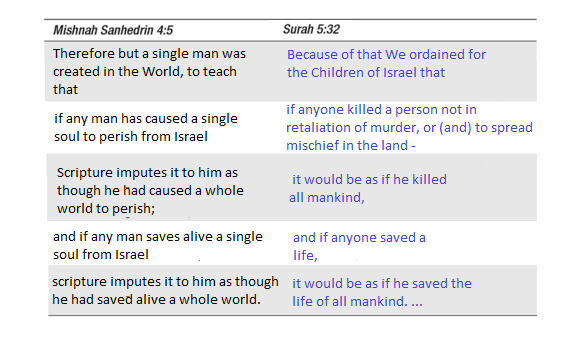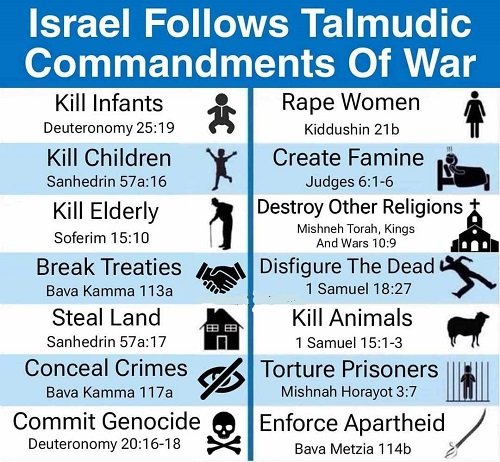𝐒𝐮𝐫𝐚𝐡 𝟓:𝟑𝟐, 𝐒𝐚𝐧𝐡𝐞𝐝𝐫𝐢𝐧, 𝐓𝐚𝐥𝐦𝐮𝐝 𝐏𝐥𝐚𝐠𝐢𝐚𝐫𝐢𝐬𝐦?
Mohamad Mostafa Nassar
Twitter:@NassarMohamadMR
𝐈𝐬𝐥𝐚𝐦 𝐢𝐬 𝐨𝐟𝐭𝐞𝐧 𝐩𝐞𝐫𝐜𝐞𝐢𝐯𝐞𝐝 𝐚𝐬 𝐚 𝐫𝐞𝐥𝐢𝐠𝐢𝐨𝐧 𝐚𝐧𝐭𝐢𝐭𝐡𝐞𝐭𝐢𝐜𝐚𝐥 𝐭𝐨 𝐖𝐞𝐬𝐭𝐞𝐫𝐧, 𝐬𝐞𝐜𝐮𝐥𝐚𝐫 𝐯𝐚𝐥𝐮𝐞𝐬. 𝐓𝐡𝐞𝐫𝐞 𝐚𝐫𝐞 𝐬𝐨𝐦𝐞 𝐰𝐡𝐨 𝐚𝐫𝐞 𝐨𝐮𝐭 𝐭𝐡𝐞𝐫𝐞, 𝐰𝐡𝐨𝐬𝐞 𝐣𝐨𝐛 𝐢𝐭 𝐢𝐬 𝐭𝐨 𝐬𝐩𝐫𝐞𝐚𝐝 𝐩𝐫𝐨𝐩𝐚𝐠𝐚𝐧𝐝𝐚 𝐚𝐠𝐚𝐢𝐧𝐬𝐭 𝐈𝐬𝐥𝐚𝐦’𝐬 𝐜𝐨𝐫𝐞 𝐭𝐞𝐚𝐜𝐡𝐢𝐧𝐠𝐬
𝐎𝐧𝐞 𝐯𝐞𝐫𝐬𝐞 𝐡𝐚𝐬 𝐛𝐞𝐞𝐧 𝐮𝐧𝐝𝐞𝐫 𝐚𝐭𝐭𝐚𝐜𝐤 𝐛𝐲 𝐨𝐩𝐩𝐨𝐧𝐞𝐧𝐭𝐬 𝐢𝐬 𝐜𝐡𝐚𝐩𝐭𝐞𝐫 𝟓, 𝐯𝐞𝐫𝐬𝐞 𝟑𝟐 𝐨𝐟 𝐭𝐡𝐞 𝐐𝐮𝐫𝐚𝐧. 𝐓𝐡𝐞𝐲 𝐚𝐬𝐬𝐞𝐫𝐭 𝐭𝐡𝐚𝐭 𝐭𝐡𝐞 𝐯𝐞𝐫𝐬𝐞 𝐝𝐨𝐞𝐬 𝐧𝐨𝐭 𝐬𝐚𝐲 𝐦𝐮𝐫𝐝𝐞𝐫 𝐢𝐬 𝐰𝐫𝐨𝐧𝐠 𝐚𝐧𝐝 𝐩𝐫𝐨𝐡𝐢𝐛𝐢𝐭𝐞𝐝 𝐢𝐧 𝐈𝐬𝐥𝐚𝐦, 𝐭𝐡𝐢𝐬 𝐰𝐞 𝐡𝐚𝐯𝐞 𝐫𝐞𝐬𝐩𝐨𝐧𝐝𝐞𝐝 𝐭𝐨 𝐡𝐞𝐫𝐞: “𝐒𝐚𝐧𝐜𝐭𝐢𝐭𝐲 𝐎𝐟 𝐋𝐢𝐟𝐞: ‘𝐈𝐟 𝐀𝐧𝐲𝐨𝐧𝐞 𝐊𝐢𝐥𝐥𝐬 𝐀 𝐏𝐞𝐫𝐬𝐨𝐧 𝐈𝐭 𝐖𝐨𝐮𝐥𝐝 𝐁𝐞 𝐀𝐬 𝐈𝐟 𝐇𝐞 𝐊𝐢𝐥𝐥𝐞𝐝 𝐀𝐥𝐥 𝐌𝐚𝐧𝐤𝐢𝐧𝐝’ – 𝐒𝐮𝐫𝐚𝐡 𝟓:𝟑𝟐“. 𝐓𝐡𝐞𝐲 𝐦𝐚𝐤𝐞 𝐭𝐡𝐞𝐬𝐞 𝐜𝐥𝐚𝐢𝐦𝐬 𝐢𝐧 𝐨𝐫𝐝𝐞𝐫 𝐭𝐨 𝐬𝐩𝐫𝐞𝐚𝐝 𝐦𝐢𝐬𝐢𝐧𝐟𝐨𝐫𝐦𝐚𝐭𝐢𝐨𝐧 𝐭𝐨 𝐢𝐧𝐧𝐨𝐜𝐞𝐧𝐭 𝐫𝐞𝐚𝐝𝐞𝐫𝐬 – 𝐭𝐨 𝐩𝐚𝐢𝐧𝐭 𝐈𝐬𝐥𝐚𝐦 𝐧𝐞𝐠𝐚𝐭𝐢𝐯𝐞𝐥𝐲 𝐟𝐨𝐫 𝐭𝐡𝐞𝐢𝐫 𝐨𝐰𝐧 𝐦𝐢𝐬𝐜𝐡𝐢𝐞𝐯𝐨𝐮𝐬 𝐞𝐧𝐝𝐬.
𝐀𝐧𝐨𝐭𝐡𝐞𝐫 𝐜𝐥𝐚𝐢𝐦, 𝐰𝐡𝐢𝐜𝐡 𝐰𝐞 𝐬𝐡𝐚𝐥𝐥 𝐫𝐞𝐬𝐩𝐨𝐧𝐝 𝐭𝐨 𝐢𝐧 𝐭𝐡𝐢𝐬 𝐚𝐫𝐭𝐢𝐜𝐥𝐞 𝐢𝐬 𝐭𝐡𝐚𝐭 𝐭𝐡𝐞 𝐯𝐞𝐫𝐬𝐞 (𝐐. 𝟓:𝟑𝟐) 𝐰𝐚𝐬 𝐩𝐥𝐚𝐠𝐢𝐚𝐫𝐢𝐳𝐞𝐝 𝐰𝐨𝐫𝐝 𝐟𝐨𝐫 𝐰𝐨𝐫𝐝 𝐟𝐫𝐨𝐦 𝐭𝐡𝐞 𝐓𝐚𝐥𝐦𝐮𝐝. 𝐋𝐞𝐭 𝐮𝐬 𝐫𝐞𝐚𝐝 𝐚 𝐭𝐫𝐚𝐧𝐬𝐥𝐚𝐭𝐢𝐨𝐧 𝐨𝐟 𝐁𝐚𝐛𝐲𝐥𝐨𝐧𝐢𝐚𝐧 𝐓𝐚𝐥𝐦𝐮𝐝: 𝐓𝐫𝐚𝐜𝐭𝐚𝐭𝐞 𝐒𝐚𝐧𝐡𝐞𝐝𝐫𝐢𝐧, 𝐭𝐫𝐚𝐧𝐬𝐥𝐚𝐭𝐞𝐝 𝐛𝐲 𝐌𝐢𝐜𝐡𝐚𝐞𝐥 𝐋. 𝐑𝐨𝐝𝐤𝐢𝐧𝐬𝐨𝐧:
“𝐓𝐡𝐞𝐫𝐞𝐟𝐨𝐫𝐞 𝐭𝐡𝐞 𝐦𝐚𝐧 𝐰𝐚𝐬 𝐜𝐫𝐞𝐚𝐭𝐞𝐝 𝐬𝐢𝐧𝐠𝐥𝐲, 𝐭𝐨 𝐭𝐞𝐚𝐜𝐡 𝐭𝐡𝐚𝐭 𝐡𝐞 𝐰𝐡𝐨 𝐝𝐞𝐬𝐭𝐫𝐨𝐲𝐬 𝐨𝐧𝐞 𝐬𝐨𝐮𝐥 𝐨𝐟 𝐚 𝐡𝐮𝐦𝐚𝐧 𝐛𝐞𝐢𝐧𝐠, 𝐭𝐡𝐞 𝐒𝐜𝐫𝐢𝐩𝐭𝐮𝐫𝐞 𝐜𝐨𝐧𝐬𝐢𝐝𝐞𝐫𝐬 𝐡𝐢𝐦 𝐚𝐬 𝐢𝐟 𝐡𝐞 𝐬𝐡𝐨𝐮𝐥𝐝 𝐝𝐞𝐬𝐭𝐫𝐨𝐲 𝐚 𝐰𝐡𝐨𝐥𝐞 𝐰𝐨𝐫𝐥𝐝, 𝐚𝐧𝐝 𝐡𝐢𝐦 𝐰𝐡𝐨 𝐬𝐚𝐯𝐞𝐬 𝐨𝐧𝐞 𝐬𝐨𝐮𝐥 𝐨𝐟 𝐈𝐬𝐫𝐚𝐞𝐥, 𝐭𝐡𝐞 𝐒𝐜𝐫𝐢𝐩𝐭𝐮𝐫𝐞 𝐜𝐨𝐧𝐬𝐢𝐝𝐞𝐫𝐬 𝐡𝐢𝐦 𝐚𝐬 𝐢𝐟 𝐡𝐞 𝐬𝐡𝐨𝐮𝐥𝐝 𝐬𝐚𝐯𝐞 𝐚 𝐰𝐡𝐨𝐥𝐞 𝐖𝐨𝐫𝐥𝐝.” (𝐁𝐚𝐛𝐲𝐥𝐨𝐧𝐢𝐚𝐧 𝐓𝐚𝐥𝐦𝐮𝐝) [𝟏]
𝐖𝐞 𝐦𝐚𝐲 𝐚𝐝𝐝 𝐚𝐥𝐬𝐨 𝐭𝐡𝐞 𝐌𝐢𝐬𝐡𝐧𝐚𝐡, 𝐭𝐫𝐚𝐧𝐬𝐥𝐚𝐭𝐞𝐝 𝐟𝐫𝐨𝐦 𝐭𝐡𝐞 𝐇𝐞𝐛𝐫𝐞𝐰 𝐰𝐢𝐭𝐡 𝐢𝐧𝐭𝐫𝐨𝐝𝐮𝐜𝐭𝐢𝐨𝐧 𝐚𝐧𝐝 𝐛𝐫𝐢𝐞𝐟 𝐞𝐱𝐩𝐥𝐚𝐧𝐚𝐭𝐨𝐫𝐲 𝐧𝐨𝐭𝐞𝐬 – 𝐛𝐲 𝐇𝐞𝐫𝐛𝐞𝐫𝐭 𝐃𝐚𝐧𝐛𝐲:
“𝐓𝐡𝐞𝐫𝐞𝐟𝐨𝐫𝐞 𝐛𝐮𝐭 𝐚 𝐬𝐢𝐧𝐠𝐥𝐞 𝐦𝐚𝐧 𝐰𝐚𝐬 𝐜𝐫𝐞𝐚𝐭𝐞𝐝 𝐢𝐧 𝐭𝐡𝐞 𝐖𝐨𝐫𝐥𝐝, 𝐭𝐨 𝐭𝐞𝐚𝐜𝐡 𝐭𝐡𝐚𝐭 𝐢𝐟 𝐚𝐧𝐲 𝐦𝐚𝐧 𝐡𝐚𝐬 𝐜𝐚𝐮𝐬𝐞𝐝 𝐚 𝐬𝐢𝐧𝐠𝐥𝐞 𝐬𝐨𝐮𝐥 𝐭𝐨 𝐩𝐞𝐫𝐢𝐬𝐡 𝐟𝐫𝐨𝐦 𝐈𝐬𝐫𝐚𝐞𝐥 𝐒𝐜𝐫𝐢𝐩𝐭𝐮𝐫𝐞 𝐢𝐦𝐩𝐮𝐭𝐞𝐬 𝐢𝐭 𝐭𝐨 𝐡𝐢𝐦 𝐚𝐬 𝐭𝐡𝐨𝐮𝐠𝐡 𝐡𝐞 𝐡𝐚𝐝 𝐜𝐚𝐮𝐬𝐞𝐝 𝐚 𝐰𝐡𝐨𝐥𝐞 𝐰𝐨𝐫𝐥𝐝 𝐭𝐨 𝐩𝐞𝐫𝐢𝐬𝐡; 𝐚𝐧𝐝 𝐢𝐟 𝐚𝐧𝐲 𝐦𝐚𝐧 𝐬𝐚𝐯𝐞𝐬 𝐚𝐥𝐢𝐯𝐞 𝐚 𝐬𝐢𝐧𝐠𝐥𝐞 𝐬𝐨𝐮𝐥 𝐟𝐫𝐨𝐦 𝐈𝐬𝐫𝐚𝐞𝐥 𝐬𝐜𝐫𝐢𝐩𝐭𝐮𝐫𝐞 𝐢𝐦𝐩𝐮𝐭𝐞𝐬 𝐢𝐭 𝐭𝐨 𝐡𝐢𝐦 𝐚𝐬 𝐭𝐡𝐨𝐮𝐠𝐡 𝐡𝐞 𝐡𝐚𝐝 𝐬𝐚𝐯𝐞𝐝 𝐚𝐥𝐢𝐯𝐞 𝐚 𝐰𝐡𝐨𝐥𝐞 𝐰𝐨𝐫𝐥𝐝. …” [𝟐]
𝐍𝐨𝐰, 𝐥𝐞𝐭’𝐬 𝐫𝐞𝐚𝐝 𝐒𝐮𝐫𝐚𝐡 𝟓:𝟑𝟐,
“𝐁𝐞𝐜𝐚𝐮𝐬𝐞 𝐨𝐟 𝐭𝐡𝐚𝐭, 𝐖𝐞 𝐝𝐞𝐜𝐫𝐞𝐞𝐝 𝐮𝐩𝐨𝐧 𝐭𝐡𝐞 𝐂𝐡𝐢𝐥𝐝𝐫𝐞𝐧 𝐨𝐟 𝐈𝐬𝐫𝐚𝐞𝐥 𝐭𝐡𝐚𝐭 𝐰𝐡𝐨𝐞𝐯𝐞𝐫 𝐤𝐢𝐥𝐥𝐬 𝐚 𝐬𝐨𝐮𝐥 𝐮𝐧𝐥𝐞𝐬𝐬 𝐟𝐨𝐫 𝐚 𝐬𝐨𝐮𝐥 𝐨𝐫 𝐟𝐨𝐫 𝐜𝐨𝐫𝐫𝐮𝐩𝐭𝐢𝐨𝐧 [𝐝𝐨𝐧𝐞] 𝐢𝐧 𝐭𝐡𝐞 𝐥𝐚𝐧𝐝 – 𝐢𝐭 𝐢𝐬 𝐚𝐬 𝐢𝐟 𝐡𝐞 𝐡𝐚𝐝 𝐬𝐥𝐚𝐢𝐧 𝐦𝐚𝐧𝐤𝐢𝐧𝐝 𝐞𝐧𝐭𝐢𝐫𝐞𝐥𝐲. 𝐀𝐧𝐝 𝐰𝐡𝐨𝐞𝐯𝐞𝐫 𝐬𝐚𝐯𝐞𝐬 𝐨𝐧𝐞 – 𝐢𝐭 𝐢𝐬 𝐚𝐬 𝐢𝐟 𝐡𝐞 𝐡𝐚𝐝 𝐬𝐚𝐯𝐞𝐝 𝐦𝐚𝐧𝐤𝐢𝐧𝐝 𝐞𝐧𝐭𝐢𝐫𝐞𝐥𝐲. 𝐀𝐧𝐝 𝐨𝐮𝐫 𝐦𝐞𝐬𝐬𝐞𝐧𝐠𝐞𝐫𝐬 𝐡𝐚𝐝 𝐜𝐞𝐫𝐭𝐚𝐢𝐧𝐥𝐲 𝐜𝐨𝐦𝐞 𝐭𝐨 𝐭𝐡𝐞𝐦 𝐰𝐢𝐭𝐡 𝐜𝐥𝐞𝐚𝐫 𝐩𝐫𝐨𝐨𝐟𝐬. 𝐓𝐡𝐞𝐧 𝐢𝐧𝐝𝐞𝐞𝐝 𝐦𝐚𝐧𝐲 𝐨𝐟 𝐭𝐡𝐞𝐦, [𝐞𝐯𝐞𝐧] 𝐚𝐟𝐭𝐞𝐫 𝐭𝐡𝐚𝐭, 𝐭𝐡𝐫𝐨𝐮𝐠𝐡𝐨𝐮𝐭 𝐭𝐡𝐞 𝐥𝐚𝐧𝐝, 𝐰𝐞𝐫𝐞 𝐭𝐫𝐚𝐧𝐬𝐠𝐫𝐞𝐬𝐬𝐨𝐫𝐬.” – 𝐐𝐮𝐫𝐚𝐧 𝟓:𝟑𝟐
𝐓𝐨 𝐦𝐚𝐤𝐞 𝐭𝐡𝐢𝐧𝐠𝐬 𝐞𝐚𝐬𝐢𝐞𝐫 𝐟𝐨𝐫 𝐨𝐮𝐫 𝐫𝐞𝐚𝐝𝐞𝐫𝐬, 𝐰𝐞 𝐡𝐚𝐯𝐞 𝐦𝐚𝐝𝐞 𝐩𝐚𝐫𝐚𝐥𝐥𝐞𝐥 𝐬𝐢𝐝𝐞-𝐛𝐲-𝐬𝐢𝐝𝐞 𝐟𝐨𝐫 𝐒𝐚𝐧𝐡𝐞𝐝𝐫𝐢𝐧 𝟒:𝟓 𝐚𝐧𝐝 𝐒𝐮𝐫𝐚𝐡 𝟓:𝟑𝟐.

𝐎𝐧𝐞 𝐭𝐡𝐢𝐧𝐠 𝐭𝐡𝐚𝐭 𝐬𝐭𝐚𝐧𝐝𝐬 𝐨𝐮𝐭 𝐰𝐡𝐞𝐧 𝐨𝐧𝐞 𝐫𝐞𝐚𝐝𝐬 𝐜𝐚𝐫𝐞𝐟𝐮𝐥𝐥𝐲 𝐢𝐬 𝐭𝐡𝐚𝐭 𝐒𝐚𝐧𝐡𝐞𝐝𝐫𝐢𝐧 𝟒:𝟓 𝐢𝐬 𝐚𝐢𝐦𝐞𝐝 𝐨𝐧𝐥𝐲 𝐚𝐭 𝐭𝐡𝐞 𝐜𝐡𝐢𝐥𝐝𝐫𝐞𝐧 𝐨𝐟 𝐈𝐬𝐫𝐚𝐞𝐥, 𝐰𝐡𝐞𝐫𝐞𝐚𝐬 𝐭𝐡𝐞 𝐐𝐮𝐫𝐚𝐧 𝐬𝐩𝐞𝐚𝐤𝐬 𝐨𝐟 𝐭𝐡𝐞 𝐰𝐡𝐨𝐥𝐞 𝐨𝐟 𝐦𝐚𝐧𝐤𝐢𝐧𝐝. 𝐒𝐚𝐧𝐡𝐞𝐝𝐫𝐢𝐧 𝟒:𝟓 𝐫𝐞𝐯𝐞𝐚𝐥𝐬 𝐭𝐡𝐚𝐭 𝐬𝐡𝐞𝐝𝐝𝐢𝐧𝐠 𝐚𝐧 𝐈𝐬𝐫𝐚𝐞𝐥𝐢𝐭𝐞 𝐛𝐥𝐨𝐨𝐝 𝐢𝐬 𝐚𝐬 𝐢𝐟 𝐤𝐢𝐥𝐥𝐢𝐧𝐠 𝐭𝐡𝐞 𝐰𝐡𝐨𝐥𝐞 𝐨𝐟 𝐡𝐮𝐦𝐚𝐧𝐢𝐭𝐲, 𝐢𝐧 𝐜𝐨𝐧𝐭𝐫𝐚𝐬𝐭, 𝐭𝐡𝐞 𝐐𝐮𝐫𝐚𝐧 𝐬𝐚𝐲𝐬 𝐬𝐥𝐚𝐲𝐢𝐧𝐠 𝐚𝐧𝐲 𝐬𝐨𝐮𝐥, 𝐌𝐮𝐬𝐥𝐢𝐦 𝐨𝐫 𝐧𝐨𝐧-𝐌𝐮𝐬𝐥𝐢𝐦, 𝐢𝐬 𝐚𝐬 𝐢𝐟 𝐤𝐢𝐥𝐥𝐢𝐧𝐠 𝐰𝐡𝐨𝐥𝐞 𝐨𝐟 𝐡𝐮𝐦𝐚𝐧𝐢𝐭𝐲. 𝐓𝐡𝐞 𝐦𝐞𝐬𝐬𝐚𝐠𝐞𝐬 𝐢𝐧 𝐛𝐨𝐭𝐡 𝐚𝐫𝐞 𝐜𝐨𝐦𝐩𝐥𝐞𝐭𝐞𝐥𝐲 𝐝𝐢𝐟𝐟𝐞𝐫𝐞𝐧𝐭.
𝐂𝐨𝐦𝐦𝐞𝐧𝐭𝐢𝐧𝐠 𝐨𝐧 𝐒𝐚𝐧𝐡𝐞𝐝𝐫𝐢𝐧 𝟒:𝟓, 𝐫𝐞𝐬𝐩𝐞𝐜𝐭𝐞𝐝 𝐉𝐞𝐰𝐢𝐬𝐡 𝐬𝐜𝐡𝐨𝐥𝐚𝐫 𝐉𝐚𝐜𝐨𝐛 𝐍𝐞𝐮𝐬𝐧𝐞𝐫 𝐬𝐭𝐚𝐭𝐞𝐬 𝐰𝐡𝐞𝐧 ‘𝐈𝐬𝐫𝐚𝐞𝐥[𝐢𝐭𝐞]’ 𝐢𝐬 𝐦𝐞𝐧𝐭𝐢𝐨𝐧𝐞𝐝, 𝐢𝐭 𝐦𝐞𝐚𝐧𝐬 𝐚 𝐉𝐞𝐰𝐢𝐬𝐡 𝐬𝐨𝐮𝐥 𝐨𝐧𝐥𝐲:
“‘𝐖𝐞 𝐈𝐬𝐫𝐚𝐞𝐥’ 𝐞𝐧𝐜𝐨𝐦𝐩𝐚𝐬𝐬𝐞𝐬 𝐦𝐚𝐧𝐲 “𝐈’𝐬” – 𝐭𝐡𝐚𝐭 𝐢𝐬, 𝐢𝐧𝐝𝐢𝐯𝐢𝐝𝐮𝐚𝐥 𝐈𝐬𝐫𝐚𝐞𝐥𝐢𝐭𝐞𝐬 (𝐨𝐫 𝐉𝐞𝐰𝐬, 𝐚 𝐦𝐮𝐜𝐡 𝐥𝐞𝐬𝐬 𝐜𝐨𝐦𝐦𝐨𝐧 𝐮𝐬𝐚𝐠𝐞). 𝐖𝐡𝐞𝐧 𝐭𝐡𝐞 𝐚𝐮𝐭𝐡𝐨𝐫𝐬𝐡𝐢𝐩 𝐨𝐟 𝐭𝐡𝐞 𝐌𝐢𝐬𝐡𝐧𝐚𝐡 𝐰𝐢𝐬𝐡𝐞𝐬 𝐭𝐨 𝐫𝐞𝐟𝐞𝐫 𝐭𝐨 𝐚𝐧 𝐢𝐧𝐝𝐢𝐯𝐢𝐝𝐮𝐚𝐥 𝐉𝐞𝐰, 𝐧𝐨𝐭 𝐬𝐮𝐫𝐩𝐫𝐢𝐬𝐢𝐧𝐠𝐥𝐲 𝐢𝐭 𝐬𝐩𝐞𝐚𝐤𝐬 𝐨𝐟 ‘𝐈𝐬𝐫𝐚𝐞𝐥,’ 𝐦𝐞𝐚𝐧𝐢𝐧𝐠 𝐚𝐧 𝐈𝐬𝐫𝐚𝐞𝐥𝐢𝐭𝐞; 𝐨𝐜𝐜𝐚𝐬𝐢𝐨𝐧𝐚𝐥𝐥𝐲, 𝐢𝐧 𝐜𝐨𝐧𝐭𝐞𝐱𝐭, 𝐭𝐡𝐢𝐬 𝐦𝐞𝐚𝐧𝐬 ‘𝐧𝐨𝐭 𝐚 𝐆𝐞𝐧𝐭𝐢𝐥𝐞,’ 𝐨𝐧𝐞 𝐨𝐟 ‘𝐮𝐬’ 𝐢𝐧 𝐠𝐞𝐧𝐞𝐫𝐚𝐥. 𝐀𝐬 𝐬𝐨𝐨𝐧 𝐚𝐬 𝐰𝐞 𝐞𝐧𝐜𝐨𝐮𝐧𝐭𝐞𝐫 ‘𝐈𝐬𝐫𝐚𝐞𝐥’ 𝐚𝐬 𝐭𝐡𝐞 𝐧𝐚𝐦𝐞 𝐨𝐟 𝐭𝐡𝐞 𝐠𝐫𝐨𝐮𝐩, 𝐰𝐞 𝐛𝐞𝐜𝐨𝐦𝐞 𝐚𝐰𝐚𝐫𝐞 𝐨𝐟 𝐭𝐡𝐢𝐬 𝐟𝐮𝐫𝐭𝐡𝐞𝐫 𝐢𝐦𝐩𝐨𝐫𝐭𝐚𝐧𝐭 𝐬𝐞𝐧𝐬𝐞 𝐨𝐟 𝐭𝐡𝐞 𝐧𝐚𝐦𝐞.

𝐓𝐡𝐞 𝐨𝐜𝐜𝐮𝐫𝐫𝐞𝐧𝐜𝐞𝐬 𝐚𝐫𝐞 𝐭𝐲𝐩𝐢𝐟𝐢𝐞𝐝 𝐛𝐲 𝐭𝐡𝐞𝐬𝐞 𝐬𝐭𝐚𝐭𝐞𝐦𝐞𝐧𝐭𝐬: ‘𝐀𝐧 𝐈𝐬𝐫𝐚𝐞𝐥𝐢𝐭𝐞 𝐰𝐡𝐨 𝐦𝐚𝐫𝐫𝐢𝐞𝐝 𝐚 𝐦𝐚𝐦𝐳𝐞𝐫-𝐰𝐨𝐦𝐚𝐧…’ (𝐌. 𝐐𝐢𝐝. 𝟗:𝟐); ‘𝐇𝐞 𝐰𝐡𝐨 𝐮𝐧𝐝𝐞𝐫𝐭𝐚𝐤𝐞𝐬 𝐭𝐨 𝐬𝐡𝐚𝐫𝐞𝐜𝐫𝐨𝐩 𝐚 𝐟𝐢𝐞𝐥𝐝 𝐛𝐞𝐥𝐨𝐧𝐠𝐢𝐧𝐠 𝐭𝐨 𝐚𝐧 𝐈𝐬𝐫𝐚𝐞𝐥𝐢𝐭𝐞, 𝐚 𝐆𝐞𝐧𝐭𝐢𝐥𝐞, 𝐚 𝐒𝐚𝐦𝐚𝐫𝐢𝐭𝐚𝐧…’ (𝐌. 𝐃𝐞𝐦. 𝟔:𝟏), 𝐦𝐞𝐚𝐧𝐢𝐧𝐠 𝐚𝐧 𝐢𝐧𝐝𝐢𝐯𝐢𝐝𝐮𝐚𝐥 𝐩𝐞𝐫𝐬𝐨𝐧 𝐢𝐧 𝐭𝐡𝐞 𝐜𝐚𝐭𝐞𝐠𝐨𝐫𝐲 𝐨𝐟 𝐈𝐬𝐫𝐚𝐞𝐥, 𝐚 𝐉𝐞𝐰; ‘𝐀𝐧𝐝 𝐥𝐞𝐭 𝐧𝐨𝐭 𝐚 𝐬𝐢𝐧𝐠𝐥𝐞 𝐬𝐨𝐮𝐥 𝐨𝐟 𝐈𝐬𝐫𝐚𝐞𝐥 𝐛𝐞 𝐡𝐚𝐧𝐝𝐞𝐝 𝐨𝐯𝐞𝐫 𝐭𝐨 𝐭𝐡𝐞𝐦’ (𝐌. 𝐓𝐞𝐫. 𝟖:𝟏𝟐), 𝐰𝐡𝐢𝐜𝐡 𝐡𝐚𝐬 𝐚 𝐬𝐢𝐦𝐢𝐥𝐚𝐫 𝐬𝐞𝐧𝐬𝐞; ‘𝐏𝐞𝐨𝐩𝐥𝐞 𝐝𝐨 𝐧𝐨𝐭 𝐚𝐜𝐜𝐞𝐩𝐭 𝐟𝐨𝐫 𝐬𝐡𝐚𝐫𝐞-𝐜𝐫𝐨𝐩𝐩𝐢𝐧𝐠 𝐚 𝐟𝐢𝐞𝐥𝐝 𝐡𝐚𝐧𝐝𝐞𝐝 𝐨𝐯𝐞𝐫 𝐨𝐧 𝐭𝐞𝐫𝐦𝐬 𝐨𝐟 ‘𝐢𝐫𝐨𝐧 𝐟𝐥𝐨𝐜𝐤’ 𝐟𝐫𝐨𝐦 𝐚𝐧 𝐈𝐬𝐫𝐚𝐞𝐥[𝐢𝐭𝐞] [𝐬𝐢𝐧𝐜𝐞 𝐢𝐭 𝐬𝐦𝐚𝐜𝐤𝐬 𝐨𝐟 𝐮𝐬𝐮𝐫𝐲]’ (𝐌. 𝐁.𝐌. 𝟓:𝟔); ‘𝐖𝐡𝐨𝐞𝐯𝐞𝐫 𝐬𝐚𝐯𝐞𝐬…, 𝐰𝐡𝐨𝐞𝐯𝐞𝐫 𝐝𝐞𝐬𝐭𝐫𝐨𝐲𝐬 𝐚 𝐬𝐢𝐧𝐠𝐥𝐞 𝐥𝐢𝐟𝐞 𝐨𝐟 𝐈𝐬𝐫𝐚𝐞𝐥…’ (𝐌. 𝐒𝐚𝐧. 𝟒:𝟓), 𝐦𝐞𝐚𝐧𝐢𝐧𝐠, 𝐚 𝐉𝐞𝐰.” [𝟑]
𝐒𝐨 𝐰𝐡𝐞𝐧 𝐭𝐡𝐨𝐬𝐞 𝐰𝐡𝐨 𝐜𝐥𝐚𝐢𝐦 𝐭𝐡𝐚𝐭 𝐭𝐡𝐞 𝐪𝐮𝐨𝐭𝐞 𝐢𝐧 𝐒𝐚𝐧 𝟒:𝟓 𝐢𝐬 𝐬𝐢𝐦𝐢𝐥𝐚𝐫 𝐢𝐧 𝐜𝐨𝐧𝐭𝐞𝐧𝐭 𝐚𝐧𝐝 𝐢𝐧 𝐦𝐞𝐚𝐧𝐢𝐧𝐠 𝐰𝐢𝐭𝐡 𝐒𝐮𝐫𝐚𝐡 𝟓:𝟑𝟐, 𝐭𝐡𝐢𝐬 𝐢𝐬 𝐧𝐨𝐭 𝐭𝐫𝐮𝐞. 𝐒𝐮𝐫𝐚𝐡 𝟓:𝟑𝟐 𝐬𝐩𝐞𝐚𝐤𝐬 𝐨𝐟 𝐩𝐫𝐨𝐡𝐢𝐛𝐢𝐭𝐢𝐧𝐠 𝐚𝐧𝐲 𝐡𝐮𝐦𝐚𝐧 𝐛𝐞𝐢𝐧𝐠 𝐤𝐢𝐥𝐥𝐞𝐝. 𝐓𝐡𝐞 𝐓𝐚𝐥𝐦𝐮𝐝 𝐪𝐮𝐨𝐭𝐞 𝐞𝐦𝐩𝐡𝐚𝐬𝐢𝐳𝐞𝐬 𝐨𝐧𝐥𝐲 𝐨𝐧 𝐚𝐧 𝐈𝐬𝐫𝐚𝐞𝐥𝐢𝐭𝐞 (𝐉𝐞𝐰𝐢𝐬𝐡) 𝐬𝐨𝐮𝐥.
𝐀𝐧𝐨𝐭𝐡𝐞𝐫 𝐪𝐮𝐨𝐭𝐞 𝐰𝐡𝐢𝐜𝐡 𝐢𝐬 𝐜𝐨𝐦𝐦𝐨𝐧𝐥𝐲 𝐜𝐢𝐭𝐞𝐝 𝐛𝐲 𝐜𝐫𝐢𝐭𝐢𝐜𝐬 𝐢𝐬 𝐒𝐚𝐧𝐡𝐞𝐝𝐫𝐢𝐧 𝟑𝟕𝐚. 𝐓𝐡𝐞𝐲 𝐜𝐥𝐚𝐢𝐦 𝐭𝐡𝐚𝐭 𝐒𝐮𝐫𝐚𝐡 𝟓:𝟑𝟐 𝐰𝐚𝐬 𝐭𝐚𝐤𝐞𝐧 𝐟𝐫𝐨𝐦 𝐒𝐚𝐧 𝟑𝟕𝐚. 𝐋𝐞𝐭’𝐬 𝐫𝐞𝐚𝐝:
“𝐅𝐨𝐫 𝐭𝐡𝐮𝐬 𝐰𝐞 𝐟𝐢𝐧𝐝 𝐢𝐧 𝐭𝐡𝐞 𝐜𝐚𝐬𝐞 𝐨𝐟 𝐂𝐚𝐢𝐧, 𝐰𝐡𝐨 𝐤𝐢𝐥𝐥𝐞𝐝 𝐡𝐢𝐬 𝐛𝐫𝐨𝐭𝐡𝐞𝐫, 𝐭𝐡𝐚𝐭 𝐢𝐭 𝐢𝐬 𝐰𝐫𝐢𝐭𝐭𝐞𝐧: 𝐭𝐡𝐞 𝐛𝐥𝐨𝐨𝐝𝐬 𝐨𝐟 𝐭𝐡𝐲 𝐛𝐫𝐨𝐭𝐡𝐞𝐫 𝐜𝐫𝐲 𝐮𝐧𝐭𝐨 𝐦𝐞: 𝐧𝐨𝐭 𝐭𝐡𝐞 𝐛𝐥𝐨𝐨𝐝 𝐨𝐟 𝐭𝐡𝐲 𝐛𝐫𝐨𝐭𝐡𝐞𝐫, 𝐛𝐮𝐭 𝐭𝐡𝐞 𝐛𝐥𝐨𝐨𝐝𝐬 𝐨𝐟 𝐭𝐡𝐲 𝐛𝐫𝐨𝐭𝐡𝐞𝐫, 𝐢𝐬 𝐬𝐚𝐢𝐝 — 𝐢.𝐞., 𝐡𝐢𝐬 𝐛𝐥𝐨𝐨𝐝 𝐚𝐧𝐝 𝐭𝐡𝐞 𝐛𝐥𝐨𝐨𝐝 𝐨𝐟 𝐡𝐢𝐬 [𝐩𝐨𝐭𝐞𝐧𝐭𝐢𝐚𝐥] 𝐝𝐞𝐬𝐜𝐞𝐧𝐝𝐚𝐧𝐭𝐬. (𝐚𝐥𝐭𝐞𝐫𝐧𝐚𝐭𝐢𝐯𝐞𝐥𝐲, 𝐭𝐡𝐞 𝐛𝐥𝐨𝐨𝐝𝐬 𝐨𝐟 𝐭𝐡𝐲 𝐛𝐫𝐨𝐭𝐡𝐞𝐫, 𝐭𝐞𝐚𝐜𝐡𝐞𝐬 𝐭𝐡𝐚𝐭 𝐡𝐢𝐬 𝐛𝐥𝐨𝐨𝐝 𝐰𝐚𝐬 𝐬𝐩𝐥𝐚𝐬𝐡𝐞𝐝 𝐨𝐯𝐞𝐫 𝐭𝐫𝐞𝐞𝐬 𝐚𝐧𝐝 𝐬𝐭𝐨𝐧𝐞𝐬.) 𝐅𝐨𝐫 𝐭𝐡𝐢𝐬 𝐫𝐞𝐚𝐬𝐨𝐧 𝐰𝐚𝐬 𝐦𝐚𝐧 𝐜𝐫𝐞𝐚𝐭𝐞𝐝 𝐚𝐥𝐨𝐧𝐞, 𝐭𝐨 𝐭𝐞𝐚𝐜𝐡 𝐭𝐡𝐞𝐞 𝐭𝐡𝐚𝐭 𝐰𝐡𝐨𝐬𝐨𝐞𝐯𝐞𝐫 𝐝𝐞𝐬𝐭𝐫𝐨𝐲𝐬 𝐚 𝐬𝐢𝐧𝐠𝐥𝐞 𝐬𝐨𝐮𝐥 𝐨𝐟 𝐈𝐬𝐫𝐚𝐞𝐥, 𝐬𝐜𝐫𝐢𝐩𝐭𝐮𝐫𝐞 𝐢𝐦𝐩𝐮𝐭𝐞𝐬 [𝐠𝐮𝐢𝐥𝐭] 𝐭𝐨 𝐡𝐢𝐦 𝐚𝐬 𝐭𝐡𝐨𝐮𝐠𝐡 𝐡𝐞 𝐡𝐚𝐝 𝐝𝐞𝐬𝐭𝐫𝐨𝐲𝐞𝐝 𝐚 𝐜𝐨𝐦𝐩𝐥𝐞𝐭𝐞 𝐰𝐨𝐫𝐥𝐝;
𝐚𝐧𝐝 𝐰𝐡𝐨𝐬𝐨𝐞𝐯𝐞𝐫 𝐩𝐫𝐞𝐬𝐞𝐫𝐯𝐞𝐬 𝐚 𝐬𝐢𝐧𝐠𝐥𝐞 𝐬𝐨𝐮𝐥 𝐨𝐟 𝐈𝐬𝐫𝐚𝐞𝐥, 𝐬𝐜𝐫𝐢𝐩𝐭𝐮𝐫𝐞 𝐚𝐬𝐜𝐫𝐢𝐛𝐞𝐬 [𝐦𝐞𝐫𝐢𝐭] 𝐭𝐨 𝐡𝐢𝐦 𝐚𝐬 𝐭𝐡𝐨𝐮𝐠𝐡 𝐡𝐞 𝐡𝐚𝐝 𝐩𝐫𝐞𝐬𝐞𝐫𝐯𝐞𝐝 𝐚 𝐜𝐨𝐦𝐩𝐥𝐞𝐭𝐞 𝐰𝐨𝐫𝐥𝐝. 𝐅𝐮𝐫𝐭𝐡𝐞𝐫𝐦𝐨𝐫𝐞, [𝐡𝐞 𝐰𝐚𝐬 𝐜𝐫𝐞𝐚𝐭𝐞𝐝 𝐚𝐥𝐨𝐧𝐞] 𝐟𝐨𝐫 𝐭𝐡𝐞 𝐬𝐚𝐤𝐞 𝐨𝐟 𝐩𝐞𝐚𝐜𝐞 𝐚𝐦𝐨𝐧𝐠 𝐦𝐞𝐧, 𝐭𝐡𝐚𝐭 𝐨𝐧𝐞 𝐦𝐢𝐠𝐡𝐭 𝐧𝐨𝐭 𝐬𝐚𝐲 𝐭𝐨 𝐡𝐢𝐬 𝐟𝐞𝐥𝐥𝐨𝐰, ‘𝐦𝐲 𝐟𝐚𝐭𝐡𝐞𝐫 𝐰𝐚𝐬 𝐠𝐫𝐞𝐚𝐭𝐞𝐫 𝐭𝐡𝐚𝐧 𝐭𝐡𝐢𝐧𝐞, 𝐚𝐧𝐝 𝐭𝐡𝐚𝐭 𝐭𝐡𝐞 𝐦𝐢𝐧𝐢𝐦 𝐦𝐢𝐠𝐡𝐭 𝐧𝐨𝐭 𝐬𝐚𝐲, 𝐭𝐡𝐞𝐫𝐞 𝐚𝐫𝐞 𝐦𝐚𝐧𝐲 𝐫𝐮𝐥𝐢𝐧𝐠 𝐩𝐨𝐰𝐞𝐫𝐬 𝐢𝐧 𝐡𝐞𝐚𝐯𝐞𝐧…” (𝐓𝐚𝐥𝐦𝐮𝐝: 𝐒𝐚𝐧𝐡𝐞𝐝𝐫𝐢𝐧 𝟑𝟕𝐚) [𝟒]
𝐖𝐡𝐞𝐧 𝐰𝐞 𝐳𝐨𝐧𝐞 𝐢𝐧 𝐭𝐨 𝐭𝐡𝐞 𝐚𝐛𝐨𝐯𝐞 𝐪𝐮𝐨𝐭𝐞, 𝐰𝐞 𝐫𝐞𝐚𝐝 𝐭𝐡𝐚𝐭 𝐭𝐡𝐞 𝐤𝐢𝐥𝐥𝐢𝐧𝐠 𝐨𝐟 𝐚𝐧 ‘𝐈𝐬𝐫𝐚𝐞𝐥𝐢𝐭𝐞’ 𝐬𝐨𝐮𝐥 𝐢𝐬 𝐢𝐟 𝐤𝐢𝐥𝐥𝐢𝐧𝐠 𝐰𝐡𝐨𝐥𝐞 𝐦𝐚𝐧𝐤𝐢𝐧𝐝. 𝐖𝐞 𝐫𝐞𝐚𝐝 𝐲𝐞𝐭 𝐚𝐠𝐚𝐢𝐧 𝐭𝐡𝐚𝐭 𝐨𝐧𝐥𝐲 𝐚𝐧 ‘𝐈𝐬𝐫𝐚𝐞𝐥𝐢𝐭𝐞’ 𝐬𝐨𝐮𝐥 𝐢𝐬 𝐬𝐚𝐜𝐫𝐞𝐝. 𝐓𝐡𝐞𝐫𝐞 𝐢𝐬 𝐧𝐨 𝐦𝐞𝐧𝐭𝐢𝐨𝐧 𝐨𝐟 𝐠𝐞𝐧𝐭𝐢𝐥𝐞 𝐬𝐨𝐮𝐥𝐬. 𝐑𝐞𝐧𝐨𝐰𝐧𝐞𝐝 𝐑𝐚𝐛𝐛𝐢 𝐒𝐚𝐦𝐮𝐞𝐥 𝐄𝐝𝐞𝐥𝐬 (𝟏𝟓𝟓𝟓 – 𝟏𝟔𝟑𝟏 𝐀𝐃), 𝐟𝐚𝐦𝐨𝐮𝐬𝐥𝐲 𝐤𝐧𝐨𝐰𝐧 𝐟𝐨𝐫 𝐡𝐢𝐬 𝐜𝐨𝐦𝐦𝐞𝐧𝐭𝐚𝐫𝐲 𝐨𝐧 𝐭𝐡𝐞 𝐓𝐚𝐥𝐦𝐮𝐝, 𝐡𝐚𝐝 𝐭𝐡𝐢𝐬 𝐭𝐨 𝐬𝐚𝐲 𝐨𝐧 𝐒𝐚𝐧𝐡𝐞𝐝𝐫𝐢𝐧 𝟑𝟕𝐚:
“‘𝐎𝐧𝐞 𝐬𝐨𝐮𝐥 𝐨𝐟 𝐈𝐬𝐫𝐚𝐞𝐥’ 𝐦𝐞𝐚𝐧𝐬 𝐄𝐗𝐂𝐋𝐔𝐒𝐈𝐕𝐄𝐋𝐘 𝐀𝐍 𝐈𝐒𝐑𝐀𝐄𝐋𝐈𝐓𝐄, 𝐰𝐡𝐨 𝐚𝐥𝐨𝐧𝐞 𝐡𝐚𝐝, 𝐭𝐡𝐫𝐨𝐮𝐠𝐡 𝐉𝐚𝐜𝐨𝐛, 𝐫𝐞𝐭𝐚𝐢𝐧𝐞𝐝 𝐭𝐡𝐞 𝐃𝐢𝐯𝐢𝐧𝐞 𝐢𝐦𝐚𝐠𝐞, 𝐢𝐧 𝐰𝐡𝐢𝐜𝐡 𝐀𝐝𝐚𝐦 𝐰𝐚𝐬 𝐜𝐫𝐞𝐚𝐭𝐞𝐝. 𝐁𝐮𝐭 𝐨𝐭𝐡𝐞𝐫 𝐧𝐚𝐭𝐢𝐨𝐧𝐬 𝐡𝐚𝐯𝐞 𝐧𝐨𝐭 𝐭𝐡𝐚𝐭 𝐢𝐦𝐚𝐠𝐞, 𝐛𝐮𝐭 𝐚𝐫𝐞 𝐥𝐢𝐤𝐞 𝐨𝐭𝐡𝐞𝐫 𝐜𝐫𝐞𝐚𝐭𝐮𝐫𝐞𝐬. 𝐖𝐡𝐨𝐞𝐯𝐞𝐫, 𝐭𝐡𝐞𝐫𝐞𝐟𝐨𝐫𝐞, 𝐝𝐞𝐬𝐭𝐫𝐨𝐲𝐬 𝐚 𝐬𝐨𝐮𝐥 𝐨𝐟 𝐭𝐡𝐞𝐦, 𝐝𝐨𝐞𝐬 𝐧𝐨𝐭 𝐝𝐞𝐬𝐭𝐫𝐨𝐲 𝐭𝐡𝐞 𝐰𝐡𝐨𝐥𝐞 𝐫𝐞𝐩𝐥𝐞𝐧𝐢𝐬𝐡𝐞𝐝 𝐰𝐨𝐫𝐥𝐝, 𝐞𝐭𝐜.” [𝟓]
𝐋𝐢𝐤𝐞𝐰𝐢𝐬𝐞, 𝐑𝐚𝐛𝐛𝐢 𝐍𝐨𝐬𝐨𝐧 𝐆𝐮𝐫𝐚𝐫𝐲, 𝐜𝐨𝐦𝐦𝐞𝐧𝐭𝐬 𝐨𝐧 𝐒𝐚𝐧 𝟑𝟕𝐚:
“𝐈𝐧 𝐚 𝐬𝐢𝐦𝐢𝐥𝐚𝐫 𝐬𝐞𝐧𝐬𝐞, 𝐰𝐞 𝐟𝐢𝐧𝐝 𝐭𝐡𝐚𝐭 𝐭𝐡𝐞 𝐬𝐨𝐮𝐥 𝐨𝐟 𝐚 𝐉𝐞𝐰𝐢𝐬𝐡 𝐩𝐞𝐫𝐬𝐨𝐧 𝐢𝐬 𝐫𝐞𝐠𝐚𝐫𝐝𝐞𝐝 𝐚𝐬 𝐚 𝐰𝐡𝐨𝐥𝐞 𝐰𝐨𝐫𝐥𝐝, 𝐭𝐨 𝐭𝐡𝐞 𝐞𝐱𝐭𝐞𝐧𝐭 𝐭𝐡𝐚𝐭 𝐰𝐞 𝐬𝐨𝐦𝐞𝐭𝐢𝐦𝐞𝐬 𝐟𝐢𝐧𝐝 𝐭𝐡𝐚𝐭 𝐭𝐡𝐞 𝐬𝐨𝐮𝐥 𝐨𝐟 𝐨𝐧𝐞 𝐩𝐞𝐫𝐬𝐨𝐧 𝐢𝐬 𝐣𝐮𝐬𝐭 𝐚𝐬 𝐢𝐦𝐩𝐨𝐫𝐭𝐚𝐧𝐭 𝐚𝐬 𝐚𝐧 𝐞𝐧𝐭𝐢𝐫𝐞 𝐠𝐫𝐨𝐮𝐩 𝐨𝐟 𝐩𝐞𝐨𝐩𝐥𝐞.” [𝟔]
𝐂𝐨𝐦𝐢𝐧𝐠 𝐛𝐚𝐜𝐤 𝐭𝐨 𝐑𝐚𝐛𝐛𝐢 𝐒𝐚𝐦𝐮𝐞𝐥 𝐄𝐝𝐞𝐥𝐬. 𝐎𝐭𝐡𝐞𝐫 𝐑𝐚𝐛𝐛𝐢𝐬 𝐬𝐮𝐜𝐡 𝐚𝐬, 𝐒𝐡𝐧𝐞’𝐮𝐫 𝐙𝐚𝐥𝐦𝐚𝐧, 𝐚𝐧𝐝 𝐑𝐚𝐛𝐛𝐢 𝐈𝐬𝐫𝐚𝐞𝐥 𝐌𝐞𝐢𝐫 𝐂𝐨𝐡𝐞𝐧 𝐚𝐥𝐬𝐨 𝐟𝐨𝐥𝐥𝐨𝐰𝐞𝐝 𝐬𝐮𝐢𝐭, 𝐚𝐧𝐝 𝐚𝐜𝐜𝐞𝐩𝐭𝐞𝐝 𝐭𝐡𝐚𝐭 𝐒𝐚𝐧𝐡𝐞𝐝𝐫𝐢𝐧 𝟑𝟕𝐚 𝐬𝐩𝐞𝐚𝐤𝐬 𝐨𝐟 𝐉𝐞𝐰𝐢𝐬𝐡 𝐬𝐨𝐮𝐥 𝐚𝐥𝐨𝐧𝐞. 𝐍𝐨𝐭 𝐭𝐡𝐞 𝐰𝐡𝐨𝐥𝐞 𝐨𝐟 𝐡𝐮𝐦𝐚𝐧𝐢𝐭𝐲 𝐚𝐬 𝐢𝐭 𝐢𝐬 𝐭𝐡𝐞 𝐜𝐚𝐬𝐞 𝐟𝐨𝐫 𝐒𝐮𝐫𝐚𝐡 𝟓:𝟑𝟐. 𝐑𝐚𝐛𝐛𝐢 𝐄𝐟𝐫𝐚𝐢𝐦 𝐒𝐡𝐦𝐮𝐞𝐥𝐢 𝐬𝐭𝐚𝐭𝐞𝐬:
“…𝐦𝐨𝐬𝐭 𝐞𝐝𝐢𝐭𝐢𝐨𝐧𝐬 𝐨𝐟 𝐭𝐡𝐞 𝐌𝐢𝐬𝐡𝐧𝐚𝐡 𝐜𝐨𝐧𝐭𝐚𝐢𝐧𝐞𝐝 𝐭𝐡𝐞 𝐯𝐞𝐫𝐬𝐢𝐨𝐧, ‘𝐢𝐟 𝐚𝐧𝐲 𝐦𝐚𝐧 𝐬𝐚𝐯𝐞𝐬 𝐚𝐥𝐢𝐯𝐞 𝐚 𝐬𝐢𝐧𝐠𝐥𝐞 𝐬𝐨𝐮𝐥 𝐢𝐧 𝐈𝐬𝐫𝐚𝐞𝐥.’ 𝐍𝐞𝐞𝐝𝐥𝐞𝐬𝐬 𝐭𝐨 𝐬𝐚𝐲, 𝐭𝐡𝐞 𝐚𝐝𝐨𝐩𝐭𝐢𝐨𝐧 𝐨𝐟 𝐨𝐧𝐞 𝐨𝐫 𝐚𝐧𝐨𝐭𝐡𝐞𝐫 𝐯𝐞𝐫𝐬𝐢𝐨𝐧 𝐡𝐚𝐬 𝐢𝐦𝐩𝐨𝐫𝐭𝐚𝐧𝐭 𝐥𝐞𝐠𝐚𝐥 𝐫𝐚𝐦𝐢𝐟𝐢𝐜𝐚𝐭𝐢𝐨𝐧𝐬: 𝐝𝐨𝐞𝐬 𝐭𝐡𝐞 𝐬𝐚𝐯𝐢𝐧𝐠 𝐨𝐟 𝐚 𝐆𝐞𝐧𝐭𝐢𝐥𝐞’𝐬 𝐥𝐢𝐟𝐞 𝐰𝐚𝐫𝐫𝐚𝐧𝐭 𝐭𝐡𝐞 𝐝𝐞𝐬𝐞𝐜𝐫𝐚𝐭𝐢𝐨𝐧 𝐨𝐟 𝐭𝐡𝐞 𝐒𝐚𝐛𝐛𝐚𝐭𝐡?
𝐓𝐡𝐢𝐬 𝐪𝐮𝐞𝐬𝐭𝐢𝐨𝐧 𝐰𝐚𝐬 𝐝𝐞𝐛𝐚𝐭𝐞𝐝 𝐢𝐧 𝐭𝐡𝐞 𝐑𝐚𝐛𝐛𝐢𝐧𝐢𝐜 𝐜𝐮𝐥𝐭𝐮𝐫𝐞, 𝐫𝐞𝐬𝐮𝐥𝐭𝐢𝐧𝐠 𝐢𝐧 𝐨𝐩𝐢𝐧𝐢𝐨𝐧𝐬 𝐭𝐡𝐚𝐭 𝐰𝐞𝐫𝐞 𝐠𝐞𝐧𝐞𝐫𝐚𝐥𝐥𝐲 𝐮𝐧𝐟𝐚𝐯𝐨𝐮𝐫𝐚𝐛𝐥𝐞, 𝐬𝐨𝐦𝐞𝐭𝐢𝐦𝐞𝐬 𝐝𝐨𝐰𝐧𝐫𝐢𝐠𝐡𝐭 𝐡𝐚𝐫𝐬𝐡, 𝐭𝐨 𝐆𝐞𝐧𝐭𝐢𝐥𝐞𝐬, 𝐚𝐬 𝐟𝐨𝐫 𝐞𝐱𝐚𝐦𝐩𝐥𝐞, 𝐭𝐡𝐞 𝐰𝐨𝐫𝐝𝐬 𝐨𝐟 𝐑𝐚𝐛𝐛𝐢 𝐒𝐚𝐦𝐮𝐞𝐥 𝐄𝐥𝐢𝐞𝐳𝐞𝐫 𝐄𝐝𝐞𝐥𝐬 (𝟏𝟓𝟓𝟓 – 𝟏𝟔𝟑𝟏), 𝐰𝐡𝐨𝐬𝐞 𝐟𝐚𝐦𝐨𝐮𝐬 𝐜𝐨𝐦𝐦𝐞𝐧𝐭𝐚𝐫𝐲, 𝐇𝐢𝐝𝐮𝐬𝐡𝐞𝐢 𝐇𝐚𝐥𝐚𝐜𝐡𝐨𝐭, 𝐚𝐜𝐜𝐨𝐦𝐩𝐚𝐧𝐢𝐞𝐬 𝐦𝐨𝐬𝐭 𝐞𝐝𝐢𝐭𝐢𝐨𝐧𝐬 𝐨𝐟 𝐭𝐡𝐞 𝐓𝐚𝐥𝐦𝐮𝐝, 𝐢𝐧 𝐭𝐡𝐞 𝐜𝐨𝐦𝐦𝐞𝐧𝐭𝐚𝐫𝐲 𝐭𝐨 𝐒𝐚𝐧 𝟑𝟕𝐚:
‘𝐓𝐡𝐢𝐬 𝐢𝐬 𝐢𝐧𝐭𝐞𝐧𝐝𝐞𝐝 𝐭𝐨 𝐭𝐞𝐚𝐜𝐡 𝐲𝐨𝐮 𝐭𝐡𝐚𝐭 𝐚𝐧𝐲 𝐦𝐚𝐧 𝐰𝐡𝐨 𝐬𝐚𝐯𝐞𝐬 𝐨𝐧𝐞 𝐬𝐨𝐮𝐥 𝐢𝐧 𝐈𝐬𝐫𝐚𝐞𝐥, 𝐚𝐧𝐝 𝐢𝐭 𝐢𝐬 𝐢𝐧𝐭𝐞𝐧𝐭𝐢𝐨𝐧𝐚𝐥𝐥𝐲 𝐬𝐩𝐞𝐜𝐢𝐟𝐢𝐞𝐝 ‘𝐨𝐧𝐞 𝐬𝐨𝐮𝐥 𝐢𝐧 𝐈𝐬𝐫𝐚𝐞𝐥,’ 𝐢𝐧 𝐬𝐢𝐧𝐠𝐮𝐥𝐚𝐫 𝐟𝐨𝐫𝐦, 𝐚𝐬 𝐭𝐡𝐢𝐬 𝐢𝐬 𝐭𝐡𝐞 𝐢𝐦𝐚𝐠𝐞 𝐨𝐟 𝐆𝐨𝐝, 𝐭𝐡𝐞 𝐒𝐢𝐧𝐠𝐮𝐥𝐚𝐫 𝐎𝐧𝐞 𝐨𝐟 𝐭𝐡𝐞 𝐰𝐨𝐫𝐥𝐝, 𝐚𝐧𝐝 𝐉𝐚𝐜𝐨𝐛’𝐬 𝐟𝐨𝐫𝐦 [𝐢.𝐞. 𝐈𝐬𝐫𝐚𝐞𝐥] 𝐢𝐬 𝐇𝐢𝐬 𝐋𝐢𝐤𝐞𝐧𝐞𝐬𝐬… 𝐛𝐮𝐭 𝐊𝐮𝐭𝐭𝐢𝐦 [𝐢.𝐞. 𝐆𝐞𝐧𝐭𝐢𝐥𝐞𝐬] 𝐝𝐨 𝐧𝐨𝐭 𝐡𝐚𝐯𝐞 𝐭𝐡𝐞 𝐟𝐨𝐫𝐦 𝐨𝐟 𝐦𝐚𝐧, 𝐨𝐧𝐥𝐲 𝐭𝐡𝐞 𝐟𝐨𝐫𝐦 𝐨𝐟 𝐨𝐭𝐡𝐞𝐫 𝐜𝐫𝐞𝐚𝐭𝐮𝐫𝐞𝐬, 𝐚𝐧𝐝 𝐰𝐡𝐨𝐞𝐯𝐞𝐫 𝐛𝐫𝐢𝐧𝐠𝐬 𝐚𝐛𝐨𝐮𝐭 𝐭𝐡𝐞 𝐥𝐨𝐬𝐬 𝐨𝐟 𝐚 𝐬𝐨𝐮𝐥 𝐚𝐦𝐨𝐧𝐠 𝐭𝐡𝐞𝐦 𝐝𝐨𝐞𝐬 𝐧𝐨𝐭 𝐥𝐨𝐬𝐞 𝐭𝐡𝐞 𝐰𝐨𝐫𝐥𝐝, 𝐚𝐧𝐝 𝐰𝐡𝐨𝐞𝐯𝐞𝐫 𝐬𝐚𝐯𝐞𝐬 𝐚 𝐬𝐨𝐮𝐥 𝐚𝐦𝐨𝐧𝐠 𝐭𝐡𝐞𝐦 𝐧𝐞𝐢𝐭𝐡𝐞𝐫 𝐚𝐝𝐝𝐬 𝐧𝐨𝐫 𝐝𝐢𝐦𝐢𝐧𝐢𝐬𝐡𝐞𝐬 𝐚𝐧𝐲𝐭𝐡𝐢𝐧𝐠 𝐢𝐧 𝐭𝐡𝐢𝐬 𝐰𝐨𝐫𝐥𝐝.
𝐑𝐚𝐛𝐛𝐢 𝐒𝐡𝐧𝐞’𝐮𝐫 𝐙𝐚𝐥𝐦𝐚𝐧 𝐨𝐟 𝐋𝐚𝐝𝐢, 𝐚𝐮𝐭𝐡𝐨𝐫 𝐨𝐟 𝐭𝐡𝐞 𝐓𝐚𝐧𝐢𝐚, 𝐚𝐧𝐝 𝐑𝐚𝐛𝐛𝐢 𝐈𝐬𝐫𝐚𝐞𝐥 𝐌𝐞𝐢𝐫 𝐂𝐨𝐡𝐞𝐧 𝐨𝐟 𝐑𝐚𝐝𝐮𝐧, 𝐭𝐡𝐞 𝐇𝐚𝐟𝐞𝐭𝐳 𝐇𝐚𝐢𝐦 (𝐌𝐢𝐬𝐡𝐧𝐚𝐡 𝐛𝐞𝐫𝐮𝐫𝐚𝐡, 𝐎𝐫𝐚𝐡 𝐇𝐚𝐢𝐦, 𝟑𝟎. 𝟖. 𝐓𝐞𝐥 𝐀𝐯𝐢𝐯. 𝐏𝐚𝐫𝐝𝐞𝐬. 𝟏𝟗𝟓𝟓) 𝐚𝐥𝐬𝐨 𝐚𝐜𝐜𝐞𝐩𝐭𝐞𝐝 𝐭𝐡𝐢𝐬 𝐌𝐢𝐬𝐡𝐧𝐚𝐡 𝐢𝐧 𝐢𝐭𝐬 𝐥𝐚𝐭𝐞𝐫, 𝐚𝐧𝐭𝐢-𝐆𝐞𝐧𝐭𝐢𝐥𝐞, 𝐯𝐞𝐫𝐬𝐢𝐨𝐧.” [𝟕]
𝐇𝐨𝐰𝐞𝐯𝐞𝐫, 𝐄𝐟𝐫𝐚𝐢𝐦 𝐒𝐡𝐦𝐮𝐞𝐥𝐢 𝐝𝐢𝐬𝐚𝐠𝐫𝐞𝐞𝐬 𝐰𝐢𝐭𝐡 𝐞𝐚𝐫𝐥𝐢𝐞𝐬𝐭 𝐚𝐧𝐝 𝐜𝐨𝐧𝐭𝐞𝐦𝐩𝐨𝐫𝐚𝐫𝐲 𝐑𝐚𝐛𝐛𝐢𝐬 𝐨𝐧 𝐒𝐚𝐧𝐡𝐞𝐝𝐫𝐢𝐧 𝟑𝟕𝐚. 𝐇𝐞𝐫𝐞, 𝐰𝐞 𝐧𝐞𝐞𝐝 𝐭𝐨 𝐢𝐧𝐭𝐫𝐨𝐝𝐮𝐜𝐞 𝐚 𝐩𝐨𝐢𝐧𝐭 𝐧𝐨𝐭 𝐝𝐢𝐬𝐜𝐮𝐬𝐬𝐞𝐝 𝐛𝐞𝐟𝐨𝐫𝐞, ‘𝐬𝐨𝐦𝐞’ 𝐞𝐝𝐢𝐭𝐢𝐨𝐧𝐬 𝐟𝐨𝐫 𝟒:𝟓 𝐚𝐧𝐝 𝐒𝐚𝐧𝐡𝐞𝐝𝐫𝐢𝐧 𝟑𝟕𝐚 𝐨𝐦𝐢𝐭 ‘𝐈𝐬𝐫𝐚𝐞𝐥. 𝐇𝐨𝐰𝐞𝐯𝐞𝐫, 𝐭𝐡𝐞 𝐰𝐨𝐫𝐝𝐬 ‘𝐈𝐬𝐫𝐚𝐞𝐥’ 𝐚𝐩𝐩𝐞𝐚𝐫 𝐢𝐧 𝐭𝐡𝐞 𝐞𝐚𝐫𝐥𝐢𝐞𝐬𝐭 𝐚𝐧𝐝 𝐦𝐨𝐬𝐭 𝐚𝐮𝐭𝐡𝐨𝐫𝐢𝐭𝐚𝐭𝐢𝐯𝐞 𝐌𝐚𝐧𝐮𝐬𝐜𝐫𝐢𝐩𝐭𝐬. 𝐈𝐭 𝐢𝐬 𝐨𝐧𝐥𝐲 𝐢𝐧 𝐥𝐚𝐭𝐭𝐞𝐫 𝐞𝐝𝐢𝐭𝐢𝐨𝐧𝐬 𝐰𝐡𝐢𝐜𝐡 𝐨𝐦𝐢𝐭 ‘𝐈𝐬𝐫𝐚𝐞𝐥’.
𝐂𝐨𝐧𝐜𝐥𝐮𝐬𝐢𝐨𝐧
𝐓𝐡𝐞 ‘𝐉𝐮𝐝𝐚𝐢𝐜 𝐩𝐫𝐢𝐧𝐜𝐢𝐩𝐥𝐞’ 𝐟𝐫𝐨𝐦 𝐒𝐚𝐧𝐡𝐞𝐝𝐫𝐢𝐧 𝟒:𝟓 𝐚𝐧𝐝 𝐒𝐚𝐧𝐡𝐞𝐝𝐫𝐢𝐧 𝟑𝟕𝐚, 𝐰𝐡𝐞𝐧 𝐡𝐞𝐥𝐝 𝐮𝐩 𝐢𝐧 𝐜𝐫𝐢𝐭𝐢𝐜𝐚𝐥 𝐬𝐜𝐫𝐮𝐭𝐢𝐧𝐲 𝐰𝐞 𝐬𝐞𝐞 𝐭𝐡𝐚𝐭 𝐭𝐡𝐞 𝐪𝐮𝐨𝐭𝐞𝐬 𝐫𝐞𝐟𝐞𝐫𝐞𝐧𝐜𝐞𝐝 𝐨𝐧𝐥𝐲 𝐫𝐞𝐟𝐞𝐫 𝐭𝐨 𝐭𝐡𝐞 𝐬𝐚𝐯𝐢𝐧𝐠 𝐨𝐟 𝐉𝐞𝐰𝐢𝐬𝐡 𝐥𝐢𝐯𝐞𝐬, 𝐧𝐨𝐭 𝐚𝐥𝐥 𝐡𝐮𝐦𝐚𝐧 𝐛𝐞𝐢𝐧𝐠𝐬 (𝐧𝐨 𝐆𝐞𝐧𝐭𝐢𝐥𝐞𝐬). 𝐇𝐞𝐧𝐜𝐞, 𝐰𝐞 𝐬𝐞𝐞 𝐭𝐡𝐚𝐭 𝐒𝐮𝐫𝐚𝐡 𝟓:𝟑𝟐 𝐚𝐧𝐝 𝐭𝐡𝐞 𝐪𝐮𝐨𝐭𝐞𝐬 𝐝𝐢𝐬𝐜𝐮𝐬𝐬𝐞𝐝 – 𝐭𝐡𝐞𝐲 𝐡𝐚𝐯𝐞 𝐯𝐚𝐬𝐭 𝐝𝐢𝐟𝐟𝐞𝐫𝐞𝐧𝐜𝐞𝐬 𝐢𝐧 𝐭𝐡𝐞𝐢𝐫 𝐜𝐨𝐧𝐭𝐞𝐧𝐭 𝐚𝐧𝐝 𝐦𝐞𝐚𝐧𝐢𝐧𝐠. 𝐅𝐮𝐫𝐭𝐡𝐞𝐫𝐦𝐨𝐫𝐞, 𝐡𝐨𝐰 𝐜𝐨𝐮𝐥𝐝 𝐭𝐡𝐞 𝐐𝐮𝐫𝐚𝐧 𝐩𝐥𝐚𝐠𝐢𝐚𝐫𝐢𝐳𝐞 𝐟𝐫𝐨𝐦 𝐭𝐡𝐞 𝐓𝐚𝐥𝐦𝐮𝐝, 𝐠𝐢𝐯𝐞𝐧 𝐭𝐡𝐞 𝐟𝐚𝐜𝐭 𝐭𝐡𝐚𝐭 𝐭𝐡𝐞𝐫𝐞 𝐢𝐬 𝐧𝐨𝐭 𝐚 𝐬𝐡𝐫𝐞𝐝 𝐨𝐟 𝐞𝐯𝐢𝐝𝐞𝐧𝐜𝐞 𝐭𝐡𝐚𝐭 𝐚𝐧 𝐞𝐱𝐭𝐚𝐧𝐭 𝐜𝐨𝐩𝐲 𝐨𝐟 𝐢𝐭 𝐞𝐱𝐢𝐬𝐭𝐞𝐝 𝐝𝐮𝐫𝐢𝐧𝐠 𝐭𝐡𝐞 𝐥𝐢𝐟𝐞𝐭𝐢𝐦𝐞 𝐨𝐟 𝐏𝐫𝐨𝐩𝐡𝐞𝐭 𝐌𝐮𝐡𝐚𝐦𝐦𝐞𝐝 (𝐩)?
𝐀𝐥𝐥𝐚𝐡 𝐊𝐧𝐨𝐰𝐬 𝐁𝐞𝐬𝐭.
𝐑𝐞𝐟𝐞𝐫𝐞𝐧𝐜𝐞𝐬:
– ‘On The Sources Of The Story Of Cain & Abel In The Qur’an‘
The Talmud and Jewish Views of Jesus and Christianity
Which Book is it the true word of God, The Bible or The Quran?
Sanctity Of Life: “If Anyone Kills A Person It Would Be As If He Killed All Mankind” – Surah 5:32
Surah 5:32, Sanhedrin, Talmud Plagiarism?
𝐄𝐯𝐢𝐝𝐞𝐧𝐜𝐞 𝐨𝐟 𝐭𝐡𝐞 𝐃𝐢𝐬𝐭𝐨𝐫𝐭𝐢𝐨𝐧 𝐨𝐟 𝐭𝐡𝐞 𝐓𝐨𝐫𝐚𝐡 𝐟𝐫𝐨𝐦 𝐭𝐡𝐞 𝐇𝐢𝐬𝐭𝐨𝐫𝐲 𝐖𝐞𝐛𝐬𝐢𝐭𝐞 (𝐀 𝐍𝐨𝐧-𝐈𝐬𝐥𝐚𝐦𝐢𝐜 𝐖𝐞𝐛𝐬𝐢𝐭𝐞)
𝐖𝐡𝐲 𝐁𝐢𝐛𝐥𝐞𝐬 𝐆𝐢𝐯𝐞𝐧 𝐭𝐨 𝐒𝐥𝐚𝐯𝐞𝐬 𝐎𝐦𝐢𝐭𝐭𝐞𝐝 𝐌𝐨𝐬𝐭 𝐨𝐟 𝐭𝐡𝐞 𝐎𝐥𝐝 𝐓𝐞𝐬𝐭𝐚𝐦𝐞𝐧𝐭
𝐌𝐚𝐧𝐲 𝐑𝐚𝐛𝐛𝐢𝐬 𝐚𝐠𝐫𝐞𝐞 𝐭𝐡𝐚𝐭 𝐄𝐳𝐫𝐚 𝐜𝐡𝐚𝐧𝐠𝐞𝐝 𝐭𝐡𝐞 𝐓𝐨𝐫𝐚𝐡 𝐓𝐞𝐱𝐭
San’aa Manuscripts reveal OLDER AND DIFFERENT Quran text? | Arabic101
Global Acknowledgment: Non-Muslim Scholars’ Confirmation of Quran and Hadith Preservation
𝐑𝐞𝐟𝐞𝐫𝐞𝐧𝐜𝐞𝐬:
[𝟏] 𝐓𝐡𝐞 𝐁𝐚𝐛𝐲𝐥𝐨𝐧𝐢𝐚𝐧 𝐓𝐚𝐥𝐦𝐮𝐝, 𝐓𝐫𝐚𝐧𝐬𝐥𝐚𝐭𝐞𝐝 𝐁𝐲 𝐌𝐢𝐜𝐡𝐚𝐞𝐥 𝐋. 𝐑𝐨𝐝𝐤𝐢𝐧𝐬𝐨𝐧 – 𝐁𝐨𝐨𝐤 𝟖: 𝐒𝐞𝐜𝐭𝐢𝐨𝐧 𝐉𝐮𝐫𝐢𝐬𝐩𝐫𝐮𝐝𝐞𝐧𝐜𝐞 (𝐃𝐚𝐦𝐚𝐠𝐞𝐬), [𝐁𝐨𝐬𝐭𝐢𝐧, 𝐓𝐡𝐞 𝐓𝐚𝐥𝐦𝐮𝐝 𝐒𝐨𝐜𝐢𝐞𝐭𝐲, 𝟏𝟗𝟏𝟖] – 𝐓𝐫𝐚𝐜𝐭 𝐒𝐚𝐧𝐡𝐞𝐝𝐫𝐢𝐧, 𝐩𝐚𝐠𝐞 𝟏𝟕𝟒𝟕 𝐡𝐭𝐭𝐩𝐬://𝐰𝐰𝐰.𝐣𝐞𝐰𝐢𝐬𝐡𝐯𝐢𝐫𝐭𝐮𝐚𝐥𝐥𝐢𝐛𝐫𝐚𝐫𝐲.𝐨𝐫𝐠/𝐣𝐬𝐨𝐮𝐫𝐜𝐞/𝐉𝐮𝐝𝐚𝐢𝐬𝐦/𝐅𝐮𝐥𝐥𝐓𝐚𝐥𝐦𝐮𝐝.𝐩𝐝𝐟
[𝟐] 𝐓𝐡𝐞 𝐌𝐢𝐬𝐡𝐧𝐚𝐡, 𝐓𝐫𝐚𝐧𝐬𝐥𝐚𝐭𝐞𝐝 𝐅𝐫𝐨𝐦 𝐓𝐡𝐞 𝐇𝐞𝐛𝐫𝐞𝐰 𝐖𝐢𝐭𝐡 𝐈𝐧𝐭𝐫𝐨𝐝𝐮𝐜𝐭𝐢𝐨𝐧 𝐚𝐧𝐝 𝐛𝐫𝐢𝐞𝐟 𝐄𝐱𝐩𝐥𝐚𝐧𝐚𝐭𝐨𝐫𝐲 𝐍𝐨𝐭𝐞𝐬, [𝐎𝐱𝐟𝐨𝐫𝐝 𝐔𝐧𝐢𝐯𝐞𝐫𝐬𝐢𝐭𝐲 𝐏𝐫𝐞𝐬𝐬, 𝟏𝟗𝟑𝟑], 𝐁𝐲 𝐇𝐞𝐫𝐛𝐞𝐫𝐭 𝐃𝐚𝐧𝐛𝐲, 𝐃.𝐃., 𝐩𝐚𝐠𝐞 𝟑𝟖𝟖
[𝟑] 𝐓𝐡𝐞 𝐁𝐨𝐝𝐲 𝐨𝐟 𝐅𝐚𝐢𝐭𝐡: 𝐈𝐬𝐫𝐚𝐞𝐥 𝐚𝐧𝐝 𝐭𝐡𝐞 𝐂𝐡𝐮𝐫𝐜𝐡, [𝐓𝐫𝐢𝐧𝐢𝐭𝐲 𝐏𝐫𝐞𝐬𝐬 𝐈𝐧𝐭𝐞𝐫𝐧𝐚𝐭𝐢𝐨𝐧𝐚𝐥; 𝐕𝐚𝐥𝐥𝐞𝐲 𝐅𝐨𝐫𝐠𝐞, 𝐏𝐞𝐧𝐧𝐬𝐲𝐥𝐯𝐚𝐧𝐢𝐚, 𝟏𝟗𝟗𝟔] 𝐁𝐲 𝐉𝐚𝐜𝐨𝐛 𝐍𝐞𝐮𝐬𝐧𝐞𝐫, 𝐩𝐚𝐠𝐞 𝟑𝟕
[𝟒] 𝐓𝐚𝐥𝐦𝐮𝐝: 𝐒𝐚𝐧𝐡𝐞𝐝𝐫𝐢𝐧 𝟑𝟕𝐚 𝐡𝐭𝐭𝐩://𝐰𝐰𝐰.𝐜𝐨𝐦𝐞-𝐚𝐧𝐝-𝐡𝐞𝐚𝐫.𝐜𝐨𝐦/𝐬𝐚𝐧𝐡𝐞𝐝𝐫𝐢𝐧/𝐬𝐚𝐧𝐡𝐞𝐝𝐫𝐢𝐧_𝟑𝟕.𝐡𝐭𝐦𝐥
[𝟓] 𝐓𝐡𝐞 𝐏𝐞𝐧𝐭𝐚𝐭𝐞𝐮𝐜𝐡 𝐀𝐜𝐜𝐨𝐫𝐝𝐢𝐧𝐠 𝐭𝐨 𝐭𝐡𝐞 𝐓𝐚𝐥𝐦𝐮𝐝: 𝐆𝐞𝐧𝐞𝐬𝐢𝐬: 𝐰𝐢𝐭𝐡 𝐚 𝐓𝐚𝐥𝐦𝐮𝐝𝐢𝐜𝐚𝐥 𝐂𝐨𝐦𝐦𝐞𝐧𝐭𝐚𝐫𝐲, [𝐋𝐨𝐧𝐝𝐨𝐧: 𝐒𝐚𝐦𝐮𝐞𝐥 𝐁𝐚𝐠𝐬𝐭𝐞𝐫 𝐀𝐧𝐝 𝐒𝐨𝐧𝐬, 𝟏𝟓, 𝐏𝐚𝐭𝐞𝐫𝐧𝐨𝐬𝐭𝐞𝐫 𝐑𝐨𝐰. 𝟏𝟖𝟖𝟑] 𝐏𝐚𝐫𝐭 𝟏, 𝐏𝐚𝐮𝐥 𝐈𝐬𝐚𝐚𝐜 𝐇𝐞𝐫𝐬𝐡𝐨𝐧, 𝐩𝐚𝐠𝐞 𝟏𝟕𝟑
[𝟔] 𝐂𝐡𝐚𝐬𝐢𝐝𝐢𝐬𝐦: 𝐈𝐭𝐬 𝐃𝐞𝐯𝐞𝐥𝐨𝐩𝐦𝐞𝐧𝐭, 𝐓𝐡𝐞𝐨𝐥𝐨𝐠𝐲, 𝐚𝐧𝐝 𝐏𝐫𝐚𝐜𝐭𝐢𝐜𝐞, 𝐛𝐲 𝐑𝐚𝐛𝐛𝐢 𝐍𝐨𝐬𝐨𝐧 𝐆𝐮𝐫𝐚𝐫𝐲, 𝐩𝐚𝐠𝐞 𝟏𝟒𝟔
[𝟕] 𝐒𝐞𝐯𝐞𝐧 𝐉𝐞𝐰𝐢𝐬𝐡 𝐂𝐮𝐥𝐭𝐮𝐫𝐞𝐬: 𝐀 𝐑𝐞𝐢𝐧𝐭𝐞𝐫𝐩𝐫𝐞𝐭𝐚𝐭𝐢𝐨𝐧 𝐨𝐟 𝐉𝐞𝐰𝐢𝐬𝐡 𝐇𝐢𝐬𝐭𝐨𝐫𝐲 𝐚𝐧𝐝 𝐓𝐡𝐨𝐮𝐠𝐡𝐭 𝐁𝐲